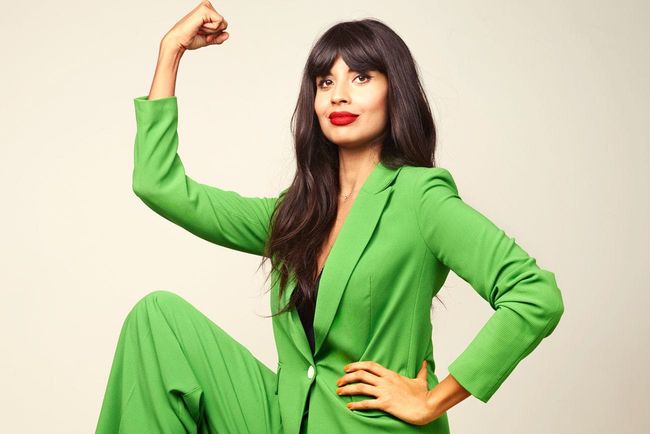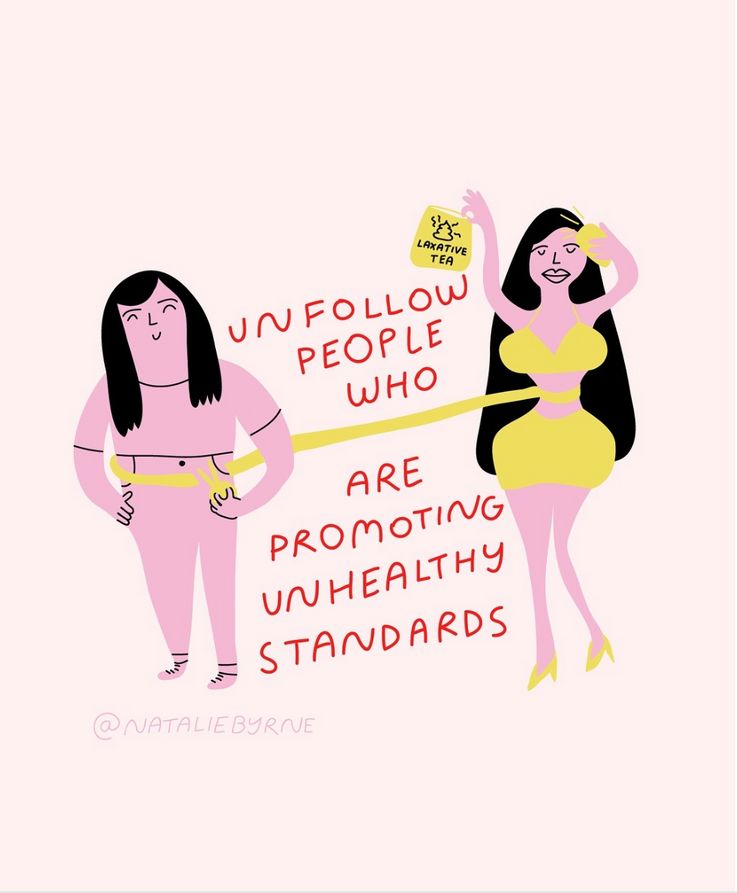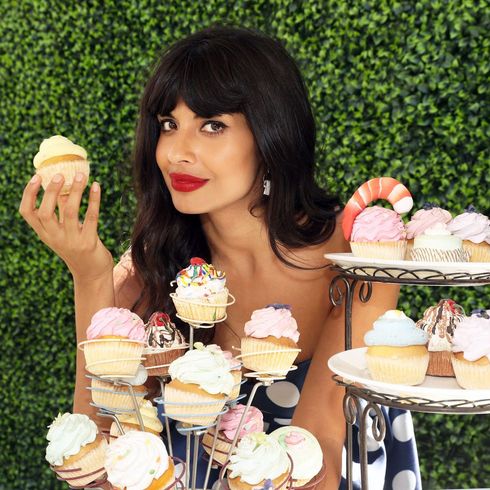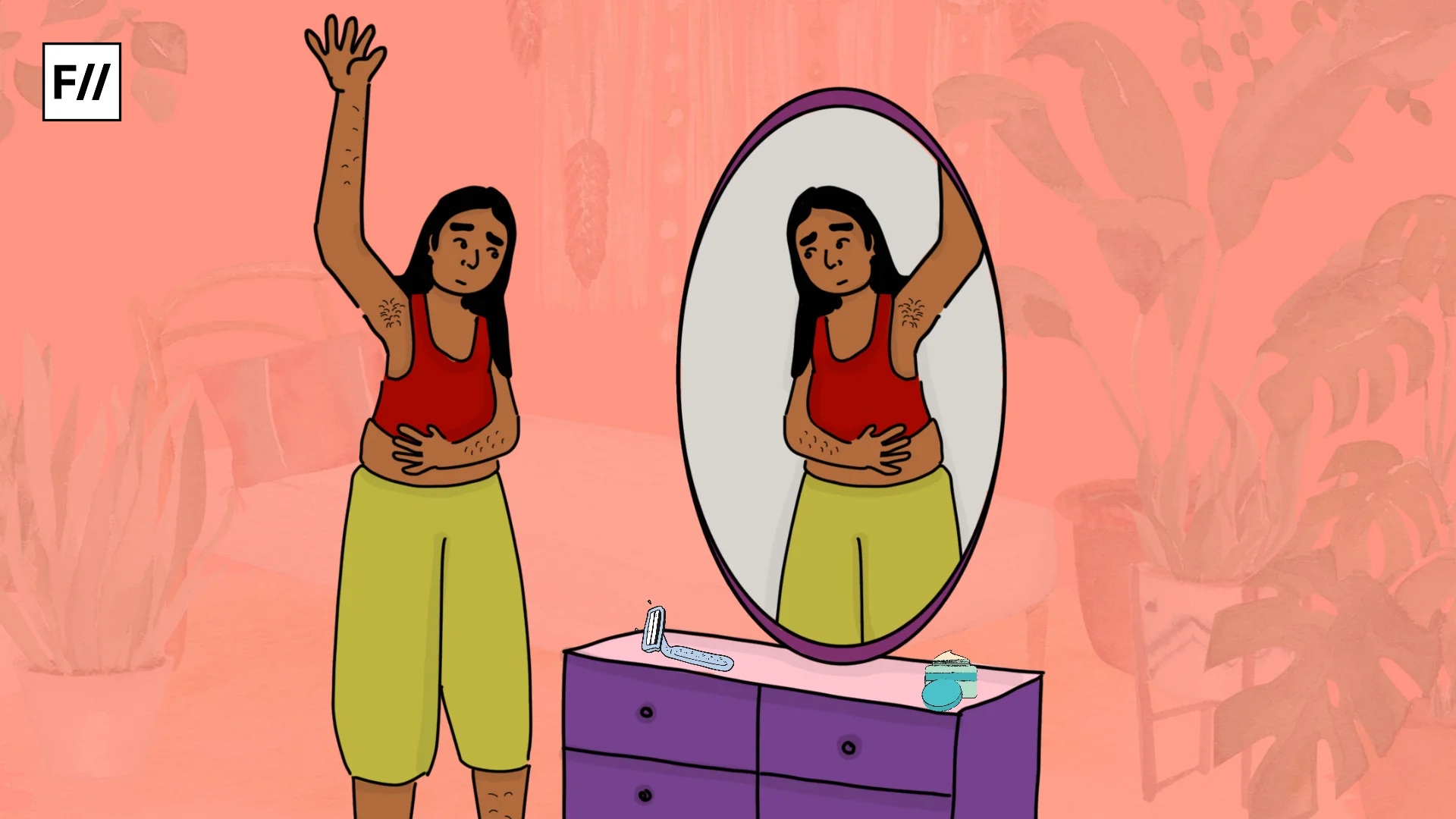One of the side-effects of an online culture saturated with Instagram models and detox teas is that a casual scroll can be followed by the nagging urge to alter yourself, whether the bulge of your tummy or the lack of dazzling whiteness of your teeth. Whatever your perceived Achilles Heel may be, there’s no doubt that an initially meaningless and lazy browse through social media can swiftly spiral into an intense episode of self-loathe. This isn’t exactly a shocker, but turns out social media is bad for your mental health.
In my experience, taking a digital ‘cleanse’ can feel inspiring, but they don’t last very wrong – sooner or later, the natural fear of missing out seeps in, and you’re teased back into the cycle. The toxicity of social media may seem inescapable, but Indian-Pakistani actress and activist Jameela Jamil is confronting these patterns headfirst.

Jameela Jamil plays the role of Tahani Al-Jamil, a pretentious and self-absorbed socialite, on NBC’s sitcom The Good Place. In real life, however, she’s carving out an inclusive and unabashed conversation space to discuss and unlearn the damaging influence of social media on one’s body-image and feelings of self-worth. She uses her popular social media accounts in order to attack the problem at its
Jamil’s brand of activism is most exciting in that she isn’t afraid to take names and lower her voice in order to accommodate social niceties – in a podcast interview with host Krishnan Guru-Murthy, she held the Kardashian women accountable for marketing unreasonable body types and essentially selling insecurity to their young audience, referring to them as “double agents… for the patriarchy”.
She’s witty and uncensored, but still brings a sense of urgency to the fact that your ‘fav’ on social media is possibly manipulating you. For example, she once tweeted screenshots of Instagram posts by Khloe Kardashian, Cardi B, Amber Rose, and Iggy Azalea that were in paid partnership with Flat Tummy Co (a brand that sells weight loss shakes, teas, and even lollipops) along with the caption, “Give us the discount codes to your nutritionists, personal chefs, personal trainers,
She’s witty and uncensored, but still brings a sense of urgency to the fact that your ‘fav’ on social media is possibly manipulating you.
Jamil has also been candid about her painful history as a teenager living with anorexia nervosa, explaining that she was “bombarded with a narrative that had no alternative. There were never any women who were celebrated for their intellect … and all of my magazines were selling me weight loss products or telling me to be thin. Otherwise, I wasn’t worth anything.” During her podcast interview, Jamil reflects on growing up during the 90s, an era where the cover of any fashion publication was plastered with angular hip bones and caved-in cheeks. There was a tendency to “glorify emaciated figures”, and while some may argue that society is much more obliging of diverse bodies now, fat-phobia has actually just adapted itself to the digital world through more subtle means.
Jamil argues that earlier, one had to physically “seek out toxicity” by perusing magazine stands and other print media, but now the anxiety of not meeting narrow body standards “finds us whether we’re looking for it or not” by creeping up in your explore page or through random ads. In response, she began the “I Weigh” movement, a platform to celebrate accomplishments that transcend the stifling confines of physical size, gender, race, age, and ability.
The intention behind naming it “I Weigh” was to reconstruct the connotation that being of a certain weight is an indicator of value or self-worth. She poetically thinks of the movement’s Instagram page as a “museum of self-love” that is organic and

However, Jameela Jamil’s activism might be a little diluted in its perspective, as many twitter users have questioned the validity of her voice and integrity. In my experience, celebrity activism can sometimes be damaging: on more than one occasion, I’ve noticed conventionally attractive, skinny women preach body positivity and self-love to their enormous follower bases and receive glorifying praise, even if they don’t necessarily follow through with meaningful action.
Also read: Can Social Media Stop Indulging In Body Shaming?
Obviously, Jamil doesn’t fall into this category of remaining complacent to the system, but she is a traditionally beautiful
Undoubtedly, Jameela Jamil’s diverse identity is a valuable addition to the body positivity movement, but she shouldn’t divert from the fact that fat women and men are its pioneers, and have put their bodies and emotions on the line in order for us to begin accepting and freeing ourselves.
The truth is, Jameela Jamil probably doesn’t share many physical similarities with her followers and online admirers, and that is where the contradiction lies.
In an interview with Marie Claire, Jamil draws the line between sincere body-positivity and the flimsy kind adopted by brands and certain celebrities to improve their public persona: “It’s become a marketing slogan, and that’s not what it was originally for…It was supposed to be inclusive, and again now, it’s been taken over by very slender, often Caucasian women. And that’s fine, but they weren’t the reason that body positivity was started and needed. So it’s turned into just a way for brands to have an excuse to talk about women’s bodies some more.” In response to accusations that Jamil herself may not be all that different from these celebrities and brands in question, she has previously reminded followers that her passionate advocacy against fat-phobia stretches as far back as 2012, and is by no means a vacant hobby.
But speaking of pasts, Jamil’s feminist record hasn’t always been spotless, as she has carped at female performers like Beyoncé and Miley Cyrus in her old blog posts, for their sensual and sexually-liberated performances. Op-ed writer Kayleigh Donaldson pointed out Jamil’s hypocrisy in October 2018, writing that, “She loves low-hanging fruit, especially when it comes to any women who make a living by being sexual in any form”.
Nevertheless, Jamil has confronted her history as a bad feminist, the pinned tweet on her Twitter account being, “It is never too late to check yourself and right your wrongs. I used to be slut-shamey, judgemental, and my feminism wasn’t intersectional enough. Nobody is born perfectly ‘woke’. Listen, read, learn, grow, change and make room for everyone. We aren’t free till ALL of us are free.” Perhaps this is most admirable about Jamil’s voice, in that she embraces the uncomfortable truth that all of us are ‘bad’ feminists in varying degrees of the word, and pushes her followers to disengage from the internalised contamination of misogyny.
These are the values that Jameela Jamil hopes will echo from the “I Weigh” movement, whose Instagram page has amassed nearly 350,000 followers. The wholesome responses encapsulate what Jamil thinks of as ‘life positivity’ rather than body
Also read: Self-Love And Body Positivity – My Experience With Belly Dancing
Yes, body positivity is pivotal to cultivating a physically and emotionally healthy connection with yourself, but life positivity is a reminder that you do not owe anyone your beauty. In its entirety, Jamil’s activism is a mixture of unvarnished, goofy, and heartfelt, all proof that she truly does care.
References
1. Vox
2. Marieclaire
3. Twitter
4. Elle
5. Instagram (I weigh)
6. Instagram (Jameela Jamil)
7. Youtube
8. Pajiba
Featured Image Source: Marieclaire




